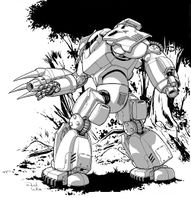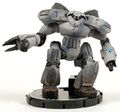Karhu

| |
| Karhu | |
|---|---|
| Production information | |
| Manufacturer | Odin Manufacturing |
| Model | KHU-R1[citation needed] |
| Class | Heavy |
| Technical specifications | |
| Mass | 65 tons |
| Chassis | Beowulf 4 Enhanced |
| Armor | Compound A2F Ferro-Fibrous |
| Engine | Pitban 325 XL |
| Communications System | Dash 2 Standard |
| Targeting Tracking System | Blade 12 |
| Heat Sinks | 12 Double heat sinks |
| Speed | 86 km/h |
| Jump Jets | None |
| Armament |
Primary Configuration
|
| BV (2.0) | 2,488 |
Contents
Description
The first Clan-tech OmniMech produced by Odin Manufacturing for the Ghost Bear Dominion, the Karhu (Finnish for "Bear") earned the reputation as a fast cavalry 'Mech.
Excited by the prospect of retooling to produce new designs using Clan technology, Odin Manufacturing were forced to bide their time as they recovered from Word of Blake raids during the early stages of the Jihad producing their existing Inner Sphere 'Mechs. Entering the bidding to produce a new Dominion Heavy OmniMech design in 3077, Odin saw off their competitor Bergan Industries two years later with a superior 65 ton design using the latest Clan technology available and sales campaign based around Rasalhagauian nationalism aimed at the former officers of KungsArmé. First deployed in 3079, too late to take part in Operation SCOUR, the Karhu made up an increasing volume of the frontline clusters of Dominion's post-Jihad Touman.
Built on an Endo Steel based chassis, powered by Pitban 325 rated XL Engine and clad in ten and half tons of Compound A2F Ferro-Fibrous armor, the Karhu featured respectable speed and armor for his size while providing thirty tons of available pod space for equipment. Twelve Double Heat Sinks coped with most of the waste heat of its varied configurations. [1]
Armament
The primary configuration appealed to the KungsArmé’s love of physical combat by mounting a three-pronged claw shaped Retractable Blade over a Plasma Cannon, supported by an ER PPC and ER Medium Laser in its left arm. Carrying a ton of Plasma reloads, the Karhu Prime also boasted superb maneuverability thanks to the inclusion of Improved Jump Jets.
Alternate Configurations
- Alt. Config. A
- Configured for longer range combat, the A configuration mounted a Gauss Rifle in its right arm alongside a left-torso mounted LRM-10. The Karhu A was not deficient at short-range either, carrying a Large Pulse Laser, ER Medium Laser and Micro Pulse Laser in its right arm. Two tons of Gauss and one ton of LRM reloads give the A config reasonable endurance, while five standard Jump Jets enhance its ability to withdraw. BV (2.0) = 2,560 [2]
- Alt. Config. B
- A short-ranged brawler, Karhu B carried a mammoth Ultra AC/20 in its left arm supported by a trio of ER Medium Lasers in its right arm. Carrying four tons of autocannon ammo and an extra two double heat sinks, the addition of a Targeting Computer and Jump Jets made the B configuration a deadly city-fighter. BV (2.0) = 2,787 [2]
- Alt. Config. C
- A mixed range combatant, the C configuration carried an Ultra AC/5 in each torso supported a ER Large Laser and ER Medium Laser in its left arm, and a Retractable Blade in its right. Including Jump Jets like most other configurations, the C config carried a ton of reloads for each Ultra Autocannon. BV (2.0) = 2,092 [2]
- Alt. Config. D
- A deadly campaign configuration, the Karhu D mounted of pair of ER PPCs in its left armo supported by a Streak SRM-6 in its left-torso and a three ER Medium Lasers in its right arm. Packed with advanced electronics, a Targeting Computer enhanced its weaponry alongside an Active Probe and ECM Suite in its right torso. Protected by an pair of Anti-Missile System, four extra double heat sinks try and prevented the Karhu D's single ton of anti-missile and Streak Missile Launcher reloads from exploding. BV (2.0) = 3,118 [2]
Custom Configurations
- Karhu Syngman
- The personal 'Mech of Lamenkov's Liability MechWarrior Syngman Seong-Hwan, Syngman was gifted the heavily damaged 'Mech after its original pilot died. While he was able to maintain its Clan-tech base chassis, he was forced to use Inner Sphere technology Omni-Pods, mounting a Retractable Blade and Inner-Sphere-grade Plasma Rifle in the right arm, and a Heavy PPC and IS-tech ER Medium Laser in the left arm. Carrying two tons of reloads for the Plasma Rifle, to enhance his effectiveness with the rest of his Lance, Syngman's 'Mech also mounted an IS-standard Beagle Active Probe, Guardian ECM Suite and C3 Slave. BV (2.0) = 1,924 [3]



